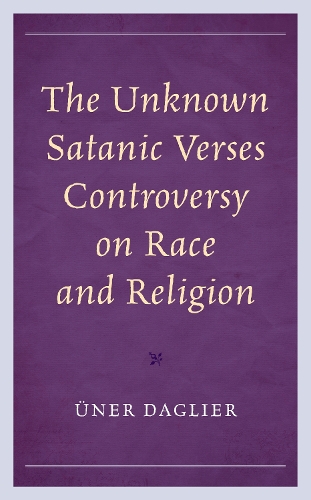
The Unknown Satanic Verses Controversy on Race and Religion
(Hardback)
Available Formats
Publishing Details
The Unknown Satanic Verses Controversy on Race and Religion
By (Author) ner Daglier
Bloomsbury Publishing PLC
Lexington Books
19th May 2020
United States
Classifications
Professional and Scholarly
Non Fiction
Literature: history and criticism
823.92
Physical Properties
Hardback
178
Width 162mm, Height 229mm, Spine 21mm
445g
Description
The Satanic Verses remains a largely misunderstood work of art; the worldwide controversy surrounding its first publication in 1988 and concurrent death threat against its author, Salman Rushdie, paradoxically led to a narrow understanding of The Satanic Verses, which focused on whether it is insulting to Islam and whether it should be banned. And despite piecemeal attention to its epistemic intricacies by students of postcolonial literature in the aftermath, The Satanic Verses essential opacity has never been sufficiently met. The Unknown Satanic Verses Controversy on Race and Religion now responds to this gap through painstakingly detailed attention to the totality of Rushdies text. Indeed it uniquely approaches The Satanic Verses attempt to mythicize race and migration, on the one hand, and secularize religion and Islam, on the other, from a perspective informed by the perennial debate on religion and politics, esoteric or coded writing in the history of political thought, especially in times of persecution, and Islamic criticism in contemporary world literature. ner Dagliers findings accord with another layer of interpretation that emphasizes Rushdies across-the-board critique of racial prejudice, penchant for cultural eclecticism, and bitterly skeptical treatment of the foundations of submission and proposal for feminist Islamic reform, as the antidote for entrenched misogyny, in a world where philosophy is for the rare and religion for the many, and which convey Rushdies constant preoccupation with the nature of miracles and postmodern case for intersubjectivity as a criterion for openness to their validity.
Reviews
Publication of Salman Rushdie's fourth novel, The Satanic Verses (1988), caused quite a stir. The book received mostly positive reviews when published in the UK, but was quickly denounced by many Muslims as blasphemy and even resulted in a call for Rushdie's death by the Ayatollah Khomeini. Daglier (postdoctoral fellow, School of Modern Languages and Cultures, Univ. of Hong Kong) provides a detailed analysis of the work, reviewing not the book's quality as literature (he says it has "limited artistic appeal," p. 6) but rather its significance as an analysis of religion, especially Islam. Others have focused on censorship attempts or controversies surrounding publication of The Satanic Verses. . . but have not offered in-depth of analysis of the text as religious commentary. One of the most impressive features of this volume is its extensive list of citations--similar to what one might find in a legal treatise. . . it will be requisite scholarship for a select group. Summing Up: Essential. Graduate students, researchers, faculty.
-- "Choice Reviews"Author Bio
ner Daglier is independent scholar.
